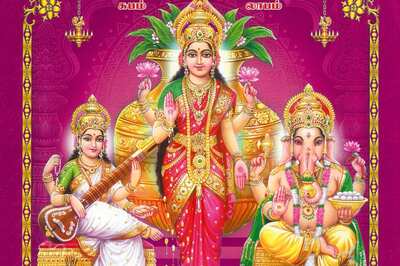
views
Yuuñ uthe aah us galī se ham
jaise koī jahāñ se uthtā hai
- Mir
When Sharmaji decided to team up with Varmaji to score music for Indian films, little did he know that a gormless advocate from Britain would draw a hasty and raggedy line on the Indian map and create, with just a stroke of his stupid pen, two nations, and Varmaji would up and leave for Pakistan, the newly created nation that was birthed in blood and gore.
Radcliffe, after carving up the country, packed his bags and left quickly, leaving millions of people uprooted and friendless in the grievous upheaval. So, the fatuous British lawyer left Sharmaji without his Varmaji. Had Manto, that caustic chronicler of Partition, an inkling of this sad sundering, he would definitely have written a glorious story of a friendship being Radcliffed.
Dil pareshaan hai, raat wiraan hai, dekh ja kis tarah aaj tanaha hai ham
- Sardar Jafri, Footpath
A lonely Sharmaji rechristened himself Khayyam and started his remarkable journey that would leave his name permanently imprinted in the annals of Indian cinema and music. The idea of India was still taking shape and the songwriters and musicians, note by note, chord by chord, were adding their might to it. The Bombay films, shaped by Russian realism and German expressionism, had dollops of stirring music that helped in binding the nation together. This was the time when the Indian moral compass was being forged and the Bombay film industry produced soulful cinema with music that exalted the everyday working-class Indian. It was an inspiring and intoxicating mix of Indian classical and folk, glued together to form an adhesive for the disparate pieces of the narrative of a newly created nation.
Ab ek anokhi duniya ki buniyaad uthai jayegi vo subah kabhi to aayegi
- Sahir, Phir Subah Hogi
It was indeed a new dawn for the Hindi film industry. Sahir was burning the screens with his rousing poetry and Mohammed Zahur, Khayyam’s original name, was making music that had the nation enthralled. The films more or less had the same theme: an emaciated broken man whose luck has run out and he, in his careless wanderings, falls in love with a carefree girl from a rich family and all hell breaks loose.
This template contained everything the new nation was trying to tackle: poverty, caste, unemployment, unbridled wealth, shaky morality, venal politics. In this hodge-podge, the girl and the boy fought their fates and furies and, in the end, came together and everyone emerged out of theatres sated and satisfied. At times, a talented writer could work his magic and elevate this banality to something boisterous. But it was because of the music and the lyrics the films made their mark. A Guru Dutt could not do without his Sahir, a Raj Kapoor without his Shankar-Jaikishan, a Dev Anand without SD Burman.
Zindagi hans ke na guzarati to bahut achchhaa tha khair hans ke na sahi ro ke guzar jaayegi
- Kaifi, Shola aur Shabnam
Weak, ineffectual, unlucky men were the staple of the Bombay film industry. A strapping, handsome Dharmendra battling vicissitudes of fate pines for his love. If the 1950s remained a rousing and stimulating decade, the 1960s started with some of the intoxication of independence petering out. Struggling men losing hope; their college degrees turning into worthless pieces of paper; employment, just like the girl they pine for, remains elusive; corruption triumphing everywhere. It was emblematic of a nation trying to find its feet: shaking, struggling, surviving somehow.
In the 1950s, Khayyam gave two superlative scores; the 60s started with Shola aur Shabnam and ended with the romantic miasma and wilful forgetfulness of Rajesh Khanna, a national madness for which there was no shrink anywhere in the world. In between, the nation lost a war to China and its chief narrative builder Nehru died. Starting out in the maddening violence of Partition, the nation, in two decades, lost its way in hippy exhalations and picture-book crooning.
Tu ab se pahle sitaron mein bas rahi thi kahin
Tujhe zamin pe bulaya gaya hai mere liye
- Sahir, Kabhi Kabhi
Salim and Javed together chipped away at the crumbling edifice of the nation and put together the broken and jagged pieces to birth the angry young man. Everything seemed broken, even Khanna tired of his yodelling and yuppiedom. There was rage everywhere and everyone seemed to be smouldering. The likes of Khayyam, whose tasteful music had strong classical roots, were not suited for the cacophony that was the 1970s. It was an angry decade, full of loud noise and empty bluster. Everyone was bloviating and brandishing his or her power. Democracy was in Zanzeer and the Sholay of national anger burned sluggishly everywhere.
Perhaps the mood of anger didn’t catch Yash Chopra, who, in 1976, made Kabhi Kabhi, a drama that had gobs of romance in its sinews. Sahir again buddied up with Khayyam to make some memorable music that is still remembered in today’s Facebook-y times. Later, towards the end of the 70s, Khayyam scored for Noorie. Jan Nisar Akhtar, writer Javed’s father, wrote the songs and Manmohan Krishna, the actor, directed under the Yash Chopra banner. Kabhi Kabhi and Noorie allowed Khayyam to hang his proud shingle in the noisome and nasty seventies.
Is anjuman mein aap ko aana hai baar baar
Deevaar-o-dar ko gaur se pehchaan lijiye
- Shahryar, Umrao Jaan
Many associate Khayyam with Umrao, the tragic story of a Lucknow courtesan. If Satyajit Ray made famous the decadence and debauchery of the Awadh kingdom, Muzaffar Ali brought Lucknow’s melancholic interiority and magical music to national living rooms. The angry young man was losing a bit of his snorting rage and the nation had no Rajesh Khanna, who had put on pounds and lost considerable hair, to fall back on. Instead, it went back a century and suddenly awoke to its glorious musical heritage. Shahryar, whose immortal ‘Seene mein jalan’ had captured the 70s’ zeitgeist, wrote absolutely captivating lines and, for a time, the nation, hooked to Khayyam’s incantatory music, forgot about the angry young man. Such was the enchanting charm of Khayyam’s music.
Phir chhidi raat baat phoolon ki
Raat hai ya baraat phoolon ki
- Maqdoom Mohiuddin, Bazaar
Khayyam didn’t stop with Umrao. He kept the nation mesmerised with his rich, mellifluous music in Bazaar, a Muslim romance. Packed with the talented men and women of parallel cinema, Sagar Sarhadi’s film slowly drifted into national consciousness with Khayyam’s arresting music playing in the background. Many who had no idea of Naseer’s powerful performances in Shyam Benegal’s films and Smita Patil’s superbly essayed roles in alternative cinema came to acknowledge their sterling work driven by the divine pull of Khayyam’s lilting music.
And then the music died. Replaced by garish sounds, mangled disco beats and idiotic lyrics. Govinda and David Dhawan took it to the other extreme of crassness and chaos. The cessation of music led to constant kookiness, in the form of vulgar lyrics and double-meaning dialogues, being dinned into the nation’s ears. India, suffering explosions and implosions, by then had become tin-eared. Khayyam had no place in this India.
And then the decades rolled on and he faded, his striking songs keeping his name and memory alive in these twittering and boastful times. In this unsound age of machine and synthesized music, in this parlous age of 140 characters and loathsome lyrics, Khayyam, with his passing, will continue to sadly remind us of these torment-filled lines of Dushyant Kumar:
Pura ghar andhiyara, gumsum saye hai,
Kamre ke kone paas khisak aaye hai
Soone ghar main kis tarah saheju maan ko.



















Comments
0 comment